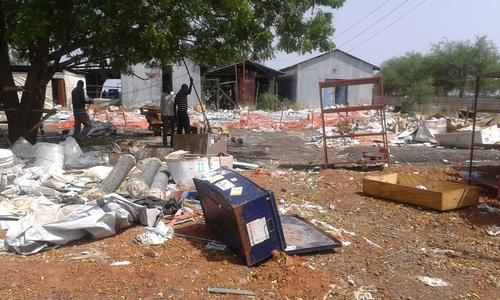Médecins Sans Frontières (MSF) has resumed activities in Melut, Upper Nile state, 16 days after renewed fighting in mid-May forced the organisation to suspend medical activities and evacuate staff. The ongoing conflict and recurrent periods of shelling in Malakal and Melut are still making it difficult both for MSF teams to access the population to provide medical assistance and for populations to access healthcare facilities.
Suspending medical activities has meant that the host population and the 20,000 internally displaced people in Denthoma 1 camp in Melut have not been able to access healthcare during this time. Those living across the Nile in the neighbouring Wau Shilluk and Noon areas, which host around 37,000 and 7,000 people respectively, have also been cut off from humanitarian assistance. Some patients receiving treatment for diseases like HIV, TB and kala azar were forced to interrupt their treatment, which could lead to drug resistance and be fatal.
When MSF teams returned to Denthoma 1 camp in Melut, where MSF is running a hospital, for a ‘flash’ visit after a week’s absence, they were shocked to find the hospital, the office and pharmacies looted and vandalised, causing incalculable losses. Water tanks were riddled with bullet holes and people had been without safe water for three days. This prompted MSF to launch an emergency procedure and to start distributing water purifiers to 4,000 families so they could treat the Nile river water they were collecting and using. MSF has also restored the water purifying system that supplies the camp with around 120m3 (120,000 litres) of clean water per day.
At the Protection of Civilians site (PoC) in Malakal town, medical consultations continue to increase, with emergency-related consultations rising from 301 in January to 861 in May. Despite heavy shelling and inter-communal clashes in the PoC, MSF continued to provide medical services to the over 30,000 people living there. Treatment is being given to people injured from the inter-communal clashes inside the PoC, as well as to those with diseases like malaria, lower respiratory tract infections and acute watery diarrhoea.
“All MSF wants is to provide healthcare to the population, regardless of ethnicity, political affiliation or religion,” said Miroslav Ilic, MSF head of mission in South Sudan. “It is quintessential that people continue to have access to quality, life-saving medical care. Therefore, it is vital that all parties in the conflict allow for the provision of humanitarian aid and healthcare to the population.”
High insecurity in the past few weeks has hampered MSF teams’ ability to move across the Nile to provide assistance to people in remote areas of Wau Shilluk and Noon. MSF has been forced to only conduct ‘flash’ medical visits, to attend to urgent medical cases and supply drugs to TB patients to ensure their treatment is not interrupted. Until the security situation stabilises, the teams cannot conduct activities normally, making life more difficult for these isolated communities.
Administrative hurdles and security constraints are constantly making it difficult to deliver humanitarian assistance: planes cannot land in conflict zones making it difficult to deliver essential items, including medicines. With the rainy season soon to start, roads will be blocked and rivers will burst their banks making transportation to remote areas even more difficult, which will leave populations in these areas even more vulnerable. It is therefore imperative that the warring parties in these areas to prioritise the provision of humanitarian aid to these remote populations during this time of conflict.



